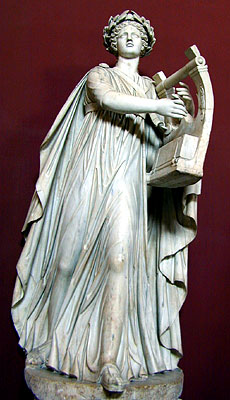Cultus Apollinis
| Line 20: | Line 20: | ||
[[Category:Roman Gods]] | [[Category:Roman Gods]] | ||
| + | Lyre and flute playing are a mark of the ritus graecus. During the republic, in Rome, the cult of Apollo was headed by a magister of a societas cantorum graecorum. Choral singing was also included in the Saecular Games of Augustus. | ||
Revision as of 06:15, 26 June 2007
-Hesiod, Theogony 920
Apollo is the ancient Greek god of healing, oracles and inspiration. He had no indigenous Roman counterpart, and until the end of the republic remained a foreign god with only a single temple outside the pomerium. He was worshipped in Rome primarily as Apollo Medicus, Apollo the healer. Apollo was actually quite a minor god in Italy and did not become popular until the advent of Augustus who built a magnificent temple on the Palatine to him. His cult was supervised by the decemviri sacris faciundis in ritu graecu.
Dedication days, dies natalis, for his temples:
28 B.C. Apollo Palatinus: a.d. VII ID Oct. October 9
431 B.C Apollo in pratis Flaminiis: III ID. Quinct. July 13
Festivals: Ludi Apollinares: prid non -III ID Quinct. July 6-13
In 430 BCE, the Temple of Apollo Medicus was dedicated to Apollo on account of a plague. Located near the Theater of Marcellus, three fluted white marble Corinthian columns of this temple were re-erected in modern times. Fragments of this temple are found in the Montemartini Museum.
During the Second Punic War in 212 BCE, the Ludi Apollinares were instituted in his honor.
Here below is Apollo Citharoedus, believed to be a copy of Skopas. The cult image housed in the temple of Apollo Palatinus is also Apollo with a cithara:
Lyre and flute playing are a mark of the ritus graecus. During the republic, in Rome, the cult of Apollo was headed by a magister of a societas cantorum graecorum. Choral singing was also included in the Saecular Games of Augustus.
